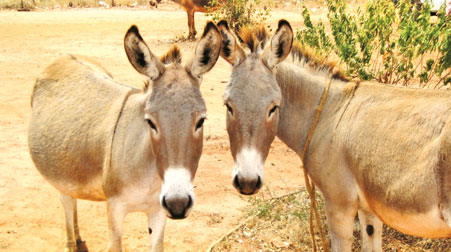Let's protect our donkeys
By S. Thillainathan
Although there are over 40 million donkeys in the world, in Sri Lanka
there are only 3,000 donkeys living in areas such as Mannar, Puttalam
and Kalpitiya. According to historic notes donkeys were used as working
animals for at least 5,000 years.
 Donkeys
mostly live in developed countries. The working donkeys are often
associated with those living at or below subsistence levels. However,
the small number of donkeys are kept for breeding or as pets in
developed countries. Donkeys
mostly live in developed countries. The working donkeys are often
associated with those living at or below subsistence levels. However,
the small number of donkeys are kept for breeding or as pets in
developed countries.
In Sri Lanka the donkey is either a domesticated animal or a wild
animal. The people generally think that donkeys are very lazy. People
often used to call a fool donkey. According to scientific research done
overseas on donkeys it is proved, that a donkey is not a fool and the
donkey has the thinking power and has all the good qualities of the
domesticated dogs. Similarly like dogs, the donkeys are very faithful,
loyal and loving to its master. However the master is not aware of the
donkey's good qualities and he very often beats and mistreats the
animal.
Extinction
In Sri Lanka the wildlife Department had launched the program to
protect the donkeys and prevent their extinction. In order to protect
the donkeys the government has decided to launch a program to possibly
take a large number of donkeys from public places and leave them in many
islands in the Northern areas of Kalpitiya, where they can live in peace
without harassment from public for many years, and increase their
numbers.
There are three breeds of donkeys living in Sri Lanka. One breed is
Atlas. This breeds from Egypt. Then there are Somali donkeys from
African countries and the third breed is known as donkeys from Syria.
The donkeys belong to the horse family. Horses, Zebras and donkeys are
slightly different from each other.
The ponies are the cross breed of the donkeys and horses. In Sri
Lanka ponies live in large numbers as wild animal in the Delft Island in
the North.
Donkeys are also known as asses. They were domesticated around 3,000
BC or 4,000 BC, probably in Egypt or Mesopotamia and have spread around
the world. Donkeys have worked together with humans for millennia.
The ancestors of the modern donkey are the Nubian and Somalian
subspecies of African wild ass. Remains of domestic donkeys dating to
the fourth millennium BC have been found in Lower Egypt, and it is
believed that the domestication of the donkey was accomplished long
after the domestication of cattle, sheep and goats in the seventh and
eighth millennia BC.
In the Dynasty IV era of Egypt, between 2675 and 2565 BC, wealthy
members of society were known to own over 1,000 donkeys, employed in
agriculture, as dairy and meat animals and as pack animals.
Skeletons
In 2003, the tomb of either King Narmer or King Hor-Aha (two of the
first Egyptian Pharaohs) was excavated and the skeletons of ten donkeys
were found buried in a manner usually used with high ranking humans.
These burials show the importance of donkeys to the early Egyptian state
and its ruler.
In short to explain the donkey's loyalty to man there is a fable.
Accordingly man who washes clothes for a fee from public owned a donkey
and a domesticated dog. After a hard day's work the man goes to sleep.
And the dog and the donkey stay outside the house. One particular day
the donkey heard a mysterious sound and the donkey knew it was a thief.
But the dog just didn't bother and it was sleeping peacefully. However
the donkey wanted to protect the master and started running around the
house making a big noise. Then the man who was disturbed came out and
started beating the donkey. In this commotion the thief escaped. Only
the donkey knew the truth. The man was unaware that his donkey was so
loyal to him.
Even today some masters cannot understand the good qualities of a
donkey and they continue to beat them. |


